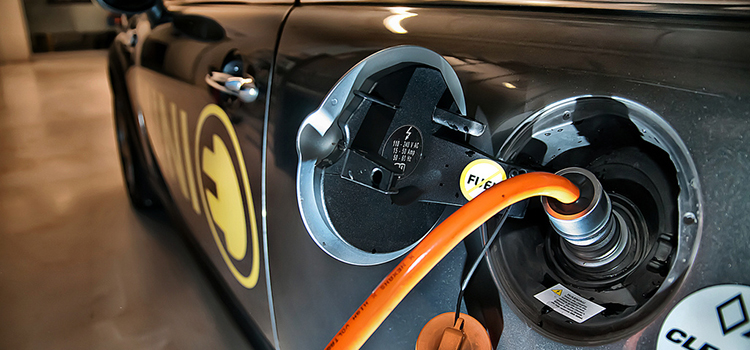How Much Range Do Electric Cars Need?

Image credits: Eneas De Troya via Flickr
(Inside Science) -- Car buyers consider many factors before making a purchase -- including comfort, style and efficiency. If they were honest and realistic about how much they drive, a majority of consumers inclined to purchase electric vehicles would choose battery-powered cars that can travel fewer than 100 miles on a full charge, new research finds. And according to the same study, that statistic isn't likely to change unless battery costs drop dramatically, despite the drastic change that represents from gas-powered vehicles.
Tesla's Model S has a range of up to about 300 miles on a fully charged battery, and a luxury car price to boot, but most electric-car models can travel no more than about 100 miles on a full charge. The new research finds that most customers will find the 100-miles or less category adequate to meet their daily driving needs, given battery costs now and in the likely near future. This is based on data that shows how far people actually drive each day.
Customers may prefer cars that are capable of driving hundreds of miles without stopping, but they may only rarely need that extra range. It may be more cost-effective to use one car for daily commutes and rent another vehicle for long trips.
However, a sticky question remains: Can car companies count on customers to purchase cars based only on economics-based considerations? Probably not, say other researchers. And, based on plans made available publicly, car manufacturers appear to agree with them.
Zhenhong Lin, a senior researcher at Oak Ridge National Laboratory in Tennessee, was trained as an engineer and now analyzes the economics and public policies related to transportation energy. His study in the journal Transportation Science, released in August, explored the multiple factors behind customer choices, including how far people actually drive on a daily basis, the variation in their driving patterns and how battery costs would have to decrease to promote electrically powered vehicles with longer ranges.
Range Issues
With gas-powered cars, driving range isn't really an issue. A car that gets 30 miles per gallon and has a 14-gallon gas tank can go over 400 miles without refueling. And if you are about to run dry, it's easy to find a place to fill up.
Electric vehicles don't use gas at all -- unlike a traditional Toyota Prius or other hybrid, in which various energy-capturing technologies charge an electric battery that then applies that energy to help move the car. Nor do electrics have backup gas engines like plug-in-hybrids do -- this category includes one version of the Toyota Prius, the Chevrolet Volt, and others. For plug-in hybrids, the gas engine usually kicks in after a battery powers the first several to couple of dozen miles, depending on the particular model.
The longest range for an electric car is the 400 miles reported for the $100,000-plus Tesla Roadster, after a recent battery update. Most mass-market electric vehicles usually start at about $30,000. Rebates from both the federal and state levels can reduce the cost by thousands. Most of these cars boast ranges of fewer than 100 miles, including the Nissan Leaf, among others. Electric vehicles cost more than their gas equivalents, and there are far more gas stations than electric-charging stations if a driver needs to stop to top up the car's battery. Most hybrids and plug-in hybrids have ranges similar to cars powered entirely by gas.
Electric vehicles are supported by a growing, but still nascent, infrastructure of charging stations in places such as car dealerships and parking areas. According to one study, about 60 percent of all cars parked at single-family homes are located within 20 feet of an electrical outlet. A typical 120-volt household outlet will take tens of hours to fully charge a drained standard electric vehicle battery. A 240-volt outlet, like those used for large air conditioners, does the job in a few hours. Both Nissan and Tesla offer even faster charging at special stations, which take about 30 minutes to add better than half of a full charge.
Tesla’s Model S sedan has a range of well over 200 miles, but costs more than $60,000, even after government incentives.
What this boils down to is most of today's electric-car models can't be used like gasoline-powered cars, and they're more expensive when purchased. The batteries cost far more than a gas car's engine and transmission.
How Low Can You Go
When Lin analyzed actual driving patterns and developed a model of driving behavior, he found that the best combination of the cost of three items -- batteries, electricity, and using an alternative vehicle to make long-distance trips -- would encourage drivers to buy cars that can travel about 100 miles on a full charge. The model suggests that this is true at current prices and will likely persist for years and probably decades.
"A lot of people think we need to have battery electric vehicles drive as far as gasoline vehicles so they can be market viable," said Lin. "The finding from this paper is that the short-range [electric vehicles] are more cost effective for most U.S. consumers for a long period of time."
He said that for some drivers a longer-range electric vehicle would be both desirable and make sense financially, but that this is not currently a large segment of electric-car buyers.
There are four major reasons why a 100-mile range should be sufficient for many customers, Lin said. Electric cars offer the chance to avoid gas stations altogether, and charge the vehicle at home. That's an added value.
Also, most people just don't drive more than 100 miles a day most of the time. When battery capacity is expensive, it's not worth paying for what you won't use.
Third, people who own electric cars might work out a backup plan for the rare times they must exceed typical driving distances. BMW, for example, is offering customers of its all-electric i3 model the chance to borrow a gas vehicle for long-distance trips.
Finally, an improving infrastructure of charging stations, which seems inevitable, will effectively expand a car's range.
"With a very good workplace charging infrastructure or public charging infrastructure, together with your home charger, you can use a 100-mile electric vehicle just like using a 200-mile electric vehicle each day," said Lin.
Conflicting Views
Other experts suggest that Lin's analysis is incomplete, because it overlooks some of the quirks of the car industry. Buying a car isn't like buying a hammer -- a utilitarian tool, in which price, quality craftsmanship and functionality are by far the three largest considerations. Other considerations can outweigh economic factors. Someone might choose a car based on its color, sound system, styling, or any combination of those and other factors.
Lin's research is valuable, said Jonn Axsen, who studies the relationship of human behavior, energy technology and environmental policy at Simon Fraser University in Burnaby, British Columbia. That's because it provides a sense of the diversity of the way people really use their cars, and combines that with analysis that shows what types of vehicles might satisfy those needs. However, making predictions about behavior is more complicated, he noted, and that’s where the conclusions of behavioral researchers like him differ from mathematical modelers. He said that a computer model won't always show what people would actually do.
"I don't think it makes sense to build a model based on these rational, mathematical calculations that people don't do. Because most vehicles people buy, it's not based on their measurements of how many miles they're driving each day or how many cents they're spending each day on fuel. It tends to be driven by a whole bunch of things," said Axsen. "And vehicle choices are often guided by that."
Even a single yearly trip can influence a car choice, said Ricardo Daziano, who studies the way engineering and economics affect the adoption and improvement of new technologies, at Cornell University in Ithaca, New York.
"Let's say every year you go to the beach and it's 500 miles," he said. "Then probably you won't buy an electric car just because of that one trip, even if the rest of the year you'll be more than fine with an electric car."
Lin said it's important not to overstate his findings.
"Among those who decide to buy a battery electric vehicle, they are better off to buy a short range versus a long range one," he said. "But they may not be better off buying a battery electric vehicle versus buying a gasoline vehicle."
What Can You Buy
Also important in the short term is Tesla's success in the industry. The company is poised to sell a significant fraction of the electric vehicles sold in the U.S., and their cars have larger ranges. The company plans to release an SUV in 2015 and a vehicle in the $35,000 neighborhood by 2017. All their vehicles will likely have ranges close to or greater than 200 miles. Tesla's success -- they've sold thousands of cars in the U.S. this year -- means that unless another automaker's electric vehicle sales explode in the near future, consumer behavior may not correspond to Lin's analysis.
"Looking at it from a model perspective, Tesla alone, and a few other players, are going to ensure that much more than 50 percent of the market share is going to go to long-range [electric vehicles], not short-range ones," said Cosmin Laslau, a technology researcher at Boston-based Lux Research, a firm that studies emerging technologies.
Daziano said that expanding the range will be crucial to expanding the sales of electric vehicles, especially versus other types such as plug-in hybrids.
"If we want these technologies to be competitive, to be really successful, then we need to come up with cars that will offer better range," he said.
Lin said that currently batteries cost about $400-600 for each unit called a kilowatt-hour. Current electric cars contain batteries with up to 85 kilowatt-hours. He said batteries cost about $1000 per kilowatt-hour just a few years ago, but that further improvement grows progressively more difficult and will proceed more slowly. Tesla's Gigafactory, a battery factory scheduled to open in Nevada in 2017, promises considerable economies of scale. According to Lux Research, the resulting savings should drop the price by about $2,800 per vehicle. Tesla reportedly projects the factory to reduce battery production costs by 30 percent.
According to Lin's analysis, battery cost would have to drop below $100 for each kilowatt-hour before a large majority of electric car buyers would be better off choosing a car that can go over 100 miles on a charge.
The other piece of this puzzle is the development of an infrastructure for charging drained batteries rapidly.
"Infrastructure improvement actually motivates consumers to choose cars with a shorter range," said Lin. "But battery cost reduction will allow consumers to choose longer range, right? So we have two dynamics here."
Most companies are generally announcing plans to expand the range of their current electric offerings, or, in Tesla's case, producing a lower-cost model with a large range. Lin said that there will definitely be a market for longer-range cars, so it will be interesting to watch what carmakers offer in the coming years, and at what price.
"The question is, will they see my paper and then rethink their strategy?" said Lin.
In a story next week, Inside Science will examine how researchers compare all-electric vehicles to plug-in hybrid vehicles.

